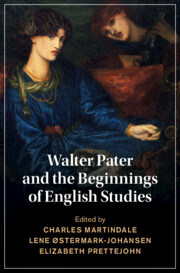Book contents
- Walter Pater and the Beginnings of English Studies
- Cambridge Studies in Nineteenth-Century Literature and Culture
- Walter Pater and the Beginnings of English Studies
- Copyright page
- Contents
- Figures
- Contributors
- Preface
- Abbreviations
- Introduction: Pater and English Literature
- Part I General
- Part II Individual Authors: Early Moderns, Romantics, Contemporaries
- Introduction to Part II
- Chapter 8 Pater’s Shakespeare
- Chapter 9 Pater and the Quaintness of Seventeenth-Century English Prose
- Chapter 10 ‘Spiritual Form’: Walter Pater’s Encounters with William Blake
- Chapter 11 Pater on Coleridge and Wordsworth
- Chapter 12 Walter Pater, Charles Lamb, and ‘the value of reserve’
- Chapter 13 Poetry in Dilution: Pater, Morris, and the Future of English
- Chapter 14 Dante Gabriel Rossetti and His School
- Postscript
- Walter Pater and English Studies: A Select Bibliography
- Index
- Cambridge Studies in Nineteenth-Century Literature and Culture
Chapter 10 - ‘Spiritual Form’: Walter Pater’s Encounters with William Blake
from Part II - Individual Authors: Early Moderns, Romantics, Contemporaries
Published online by Cambridge University Press: 14 November 2023
- Walter Pater and the Beginnings of English Studies
- Cambridge Studies in Nineteenth-Century Literature and Culture
- Walter Pater and the Beginnings of English Studies
- Copyright page
- Contents
- Figures
- Contributors
- Preface
- Abbreviations
- Introduction: Pater and English Literature
- Part I General
- Part II Individual Authors: Early Moderns, Romantics, Contemporaries
- Introduction to Part II
- Chapter 8 Pater’s Shakespeare
- Chapter 9 Pater and the Quaintness of Seventeenth-Century English Prose
- Chapter 10 ‘Spiritual Form’: Walter Pater’s Encounters with William Blake
- Chapter 11 Pater on Coleridge and Wordsworth
- Chapter 12 Walter Pater, Charles Lamb, and ‘the value of reserve’
- Chapter 13 Poetry in Dilution: Pater, Morris, and the Future of English
- Chapter 14 Dante Gabriel Rossetti and His School
- Postscript
- Walter Pater and English Studies: A Select Bibliography
- Index
- Cambridge Studies in Nineteenth-Century Literature and Culture
Summary
The relationship between the arts was central to Pater. Although Pater never devoted a whole essay to Blake, his name surfaces in discussions about form and style, soul and mind. This chapter traces Pater’s engagement with Blake, focusing on Blake’s function in Pater’s anachronic poetics. He appreciates Michelangelo through Hugo and Blake, who features as a ‘“survival” from a different age’ in essays on Demeter and Dionysus. Exhibitions in 1871 and 1876 present Blake’s allegorical portraits of Pitt, Nelson, and Napoleon as ‘Spiritual Forms’, a dystopian title Pater paradoxically repurposed to capture an embodied aesthetic and heal the separation between form and content. Comparison with Blake’s Descriptive Catalogue (1809) reveals how both Blake and Pater look to sculpture to develop an ideal of the human form divine. Explicit references to Blake’s illustrations to Job and Robert Blair’s The Grave reveal the role played by visual images in Pater’s writing, illuminating the inter-art dynamics of his critical practice. Pater’s Blake brings out a discipline of literary form that is shaped by a multisensorial aesthetic.
- Type
- Chapter
- Information
- Walter Pater and the Beginnings of English Studies , pp. 198 - 215Publisher: Cambridge University PressPrint publication year: 2023

